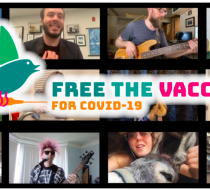Free the vaccine for COVID-19 Favorite
Free the Vaccine for COVID-19 is a campaign aimed at securing everyone access to Covid-19 vaccine.
The campaign's goal is to ensure the vaccine is freely accessible to everyone in the world. Its primary targets include: 1) university faculty who can pressure their institutions to be socially responsible in patenting and licensing of publicly funded medicines like vaccines developed in university labs, 2) Ministers of Health or other funding bodies, and 3) Pharmaceutical CEOs.
The campaign aims to ensure that 1. the people who will benefit will be residents of entire nations, often those historically written off by pharmaceutical providers because they are too poor to profit off of, 2. uninsured residents of wealthy nations will have a chance to survive, and 3. everyone benefits from getting vaccinated, because flattening the curve isn’t enough and we can n only eliminate the curve after everyone is vaccinated.
Each week, Lab participants meet online for training and lessons from special guest experts who have successfully fought for equal access to medicines. Then the participants do weekly assignments in small teams to both learn more and to perform action experiments.
Because the social-political landscape has fundamentally shifted, the campaign does not resort to old methods of activism – holding up signs at a traditional crowded protest march is not an option. They are finding new, better ways that work in our current context through an “Advocacy Innovation Lab.” While the virologists are working in their lab developing a vaccine, they’re working to make sure that vaccine is freely available.
The organizers implemented a global program designed for the time of physical distancing with weekly online courses on innovative advocacy and best practices in access to medicines advocacy. From 300+ volunteers we have formed “Salk Squads” of 4-6 people (named after Jonas Salk who gave the vaccine for polio to the world).
The campaign consists of a collective of volunteers – artists, health workers, students, activists – from 29 countries around the world, working from homes during the COVID-19 pandemic. The project is led by two non-profit organizations; Universities Allied for Essential Medicines and the Center for Artistic Activism, to date using general operating funds and individual donations.
Each week, Lab participants meet online for training and lessons from special guest experts who have successfully fought for equal access to medicines. Then the participants, in small teams of 4-7 that are regionally-based, do weekly assignments to both learn more and to perform action experiments. They may experiment with narratives and ways to use social media to encourage health officials to pledge to support equal access to treatment. They may test social distancing performances that encourage people to pressure their governments. Over the course of 4 months, hundreds of actions will be implemented, and each group will be guided to reflect and refine their actions in order to learn from them and share with others.
Hundreds of people are remotely coordinating, planning and working together to ensure global equity in access to medicines. Within days of our initial announcement we had over 600 sign up, and since then over 300 volunteers have continued to work on the campaign each week. They are from 29 countries on every continent (except Antarctica!). They are young (79% are under 45), 66% identify as women, 60% as activists, and 36% as artists or designers.







